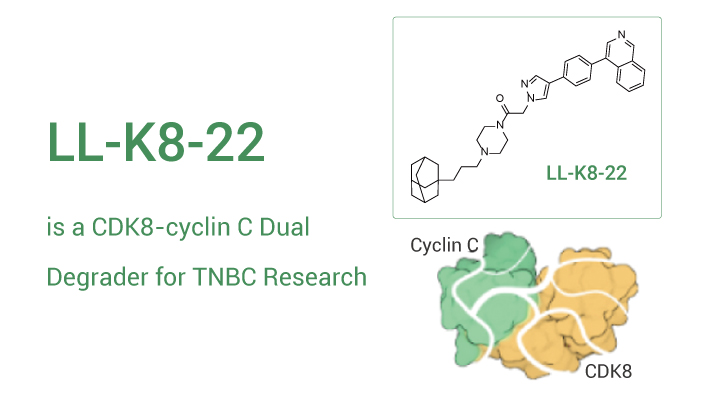CDK8 is a transcription-associated cyclin-dependent protein kinase (CDK) and also is a colorectal cancer oncogene. Cyclin C is a member of the cyclin family of proteins. Besides, Cyclin C interacts with cyclin-dependent kinase 8 and induces the phosphorylation of the carboxy-terminal domain of the large subunit of RNA polymerase II. Importantly, CDK8 and its binding partner cyclin C and MED12/MED13 form the kinase module of the mediator complex and play an important role in the regulation of transcription.
The CDK8–cyclin C complex directly or indirectly regulates various signaling pathways, including STAT1, Wnt-β-catenin, Notch, Smads, HIF1α, p21/p53, and NFκB. Meanwhile, The CDK8-cyclin C complex also is an important anti-tumor target. Research shows that inhibition of the CDK8-cyclin C complex can lead to enhanced NK cell-mediated cytotoxicity and thus improve cancer prognosis.
In this article, we will introduce a CDK8-cyclin C dual degrader, LL-K8-22.

LL-K8-22 is a selective, durable, and small-molecule degrader of the CDK8-cyclin C complex with DC50 values of 2.52 and 2.64 μM, respectively. Besides, This compound (0-10 μM, 24 h) degrades the CDK8-cyclin C complex in a dose-dependent manner. Moreover, (0-10 μM, 24 h) degrades the CDK8-cyclin C complex in a dose-dependent manner. Other more, Itsignificantly downregulated EAPP (E2F family binding protein). In addition, LL-K8-22 (0-8 μM, 24 h) reduces Ser 2 and Ser 5 phosphorylation in a dose-dependent manner. Meanwhile, LL-K8-22 (0-8 μM, 24 h) inhibits the Ser 727 phosphorylation of STAT1 and did not affect Janus kinase (JAK)-mediated phosphorylation of Tyr 701.
All in all, LL-K8-22 is a CDK8-cyclin C dual degrader. LL-K8-22 has the potential for the research of triple-negative breast cancer (TNBC).
Reference:
[1] Wang M, et al. J Med Chem. 2023 Apr 13;66(7):4932-4951.